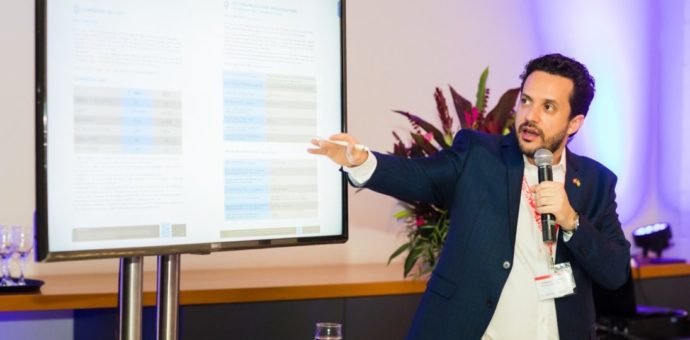Dynasty will soon begin a roadshow with selected investors in Europe to start selling the DYN, a regulated payment token, accepted worldwide, backed by real estates spread across almost every continent, mostly in South America, North America, Europe and Asia. The idea, in this phase of private supply, is to sell 800 thousand in Europe, each with a unit value of 50 Swiss francs, totaling 40 million Swiss francs (approximately US$ 41 million). Additional 200 thousand are intended for selected investors in Brazil.
The announcement of the start of the road show to Europe was marked by an event held on February 13 at the Consulate General of Switzerland in São Paulo. The cocktail was attended by more than 60 people, including market representatives, investors, judges and even congressmen. Daniel Alves, the football player, one of Dynasty’s partners, was present. Participants received at the end of the event an air drop of 1 DYN token, which can be exchanged for cash in six months.
For Dynasty’s CEO and founder, Eduardo Carvalho, the start-up for the tokens selling to the European market is a chance to bring institutional investors closer to the cryptocurrency market by making available tokens backed in real-world assets, with greater liquidity than traditional markets. “In the U.S. we already have 22% of institutional investors positioning in crypto and we see this as a present trend”, he predicts.
In the U.S. we already have 22% of institutional investors positioning in crypto and we see this as a current trend.

Transfero is in charge of custody and distribution
The custody and distribution of the token will be done by Transfero Swiss AG, a one stop shop for institutional clients and investors of high purchasing power who want to be exposed to the cryptomarket. During the event at the Consulate, Transfero’s Head of Investments, Carlos Russo, said that BRZ, the first stablecoin pegged to a currency from an emerging country issued by the company, could be very useful in transactions with the DYN token.
The overall liquidity of Dynasty’s DYN token is one of its attractions in relation to investments in traditional real estate funds. While even the largest real estate investment funds have a low daily liquidity, and in the local currency where they are traded, a crypto token such as the DYN can have a much higher daily transaction volume than the world’s largest real estate funds, besides the possibility of settlement in cryptocurrencies (Bitcoin, BRZ, TrueUSD) and other distinct fiduciary currencies (USD, EUR, BRL, among others). In addition to all these innovations, transaction costs with cryptocurrencies are significantly lower than those in the traditional market, which brings benefit to the investor, as usually these costs are passed on to the investor.
How the investment in the DYN token works
Investors’ amounts raised by the purchase of DYN tokens from Dynasty will be used to purchase high-end real estate in various locations around the world. The rental and/or sale value of these properties will be used to repurchase the tokens of those who want to sell. After repurchased, tokens are destroyed – or burned, as mentioned in the industry jargon.
The investor’s profitability is then given by the variation of the value of the token from these supply reduction movements. For example, if 3% of tokens are burned, the trend is that the valuation is of 3%.
The project foresees, in all, the sale of 21 million tokens in four tranches annually. The minimum investment is 100 DYN or approximately 5,000 Swiss francs. Investors can monitor all token transactions in Ether Scan.
The first tranche will be 5 million DYN, whose resources will be invested in commercial real estate already rented. The following tranches, with approximately equal number of tokens, start to buy assets of higher levels of risk and return. The public offering of tokens must take place within six months of the release date.
The roadshow will pass through countries where interest rates are negative. In these locations, investors seek assets with a higher level of attractiveness since government bonds do not compensate and, therefore, there should be greater interest in the project. Even in Brazil, with interest at 4%, the tokens had a good receptivity from the market, Carvalho reviews.







